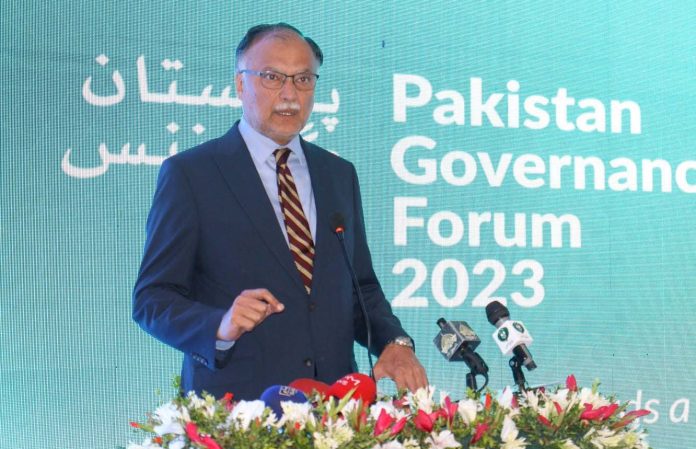
Staff Report
ISLAMABAD: Minister for Planning, Development and Special Initiatives Professor Ahsan Iqbal on Tuesday highlighted the critical role of good governance in the country to effectively confront challenges amid the rapid global transformation.
Addressing the inaugural session of a two-day “Pakistan Governance Forum-2023,” he acknowledged the challenges posed by rapid technological advancements, social transformation, and the growing demand for active citizen participation in governance.
The event was organized by the Ministry of Planning, Development and Special Initiatives to develop a roadmap for a stable, agile and transparent governance system in the country. It brought together eminent leaders, policymakers, analysts, participants, and students to discuss and chart a transformative path for the nation’s future.
“This is an era which is seeing unprecedented change in human civilization’s history. My generation has seen the transition from Takhti and Slate (wooden & metal writing boards) to 5G technology. Never any generation in the history of mankind saw such a rapid transformation,” Ahsan said stressing the need for a balanced approach that embraced change while preserving the stability and order in society.
The minister said the 20th century saw two models of rapid transformation; one was Glasnost and Perestroika undertaken by Mikhail Gorbachev that ‘model of change’ brought the collapse of the Soviet Union.
The other was undertaken by Deng Xiaoping in China which brought about a mega transformation in China by wiping out poverty and the journey towards prosperity continued.
He also quoted a saying of renowned philosopher Alfred North “The art of progress is to preserve order amid change and to preserve change amid order.”
Ahsan Iqbal highlighted the importance of the five-E framework for Pakistan’s progress, focusing on Exports, E-Pakistan (digital revolution), Environment, Energy, and Equity & Empowerment.
He emphasized the significance of restructuring the economy to become an export-led growth economy and harnessing the power of Pakistan’s young population to become a leading player in the digital economy.
The minister urged for an inclusive and collaborative approach to governance, where political differences are set aside, and the entire nation worked together as “Team Pakistan” to address the country’s challenges.
He was of the view that governance must be responsible, transparent, and stable to build public trust and ensure accountability.
Addressing the governance challenges, the minister emphasized the need for efficiency and transparency in government operations.
He highlighted the implementation of policies and the importance of practical actions in bridging the “knowing-doing gap.”
Ahsan Iqbal also stressed the significance of effective local governments to bring governance closer to communities and ensure their active participation in decision-making processes.
He expressed his commitment to work towards the prosperity and growth of Pakistan, urging everyone to adopt a positive and collaborative approach.
He called for a collective effort in finding practical and doable ways to implement the country’s knowledge and wisdom for achieving sustainable development goals.



